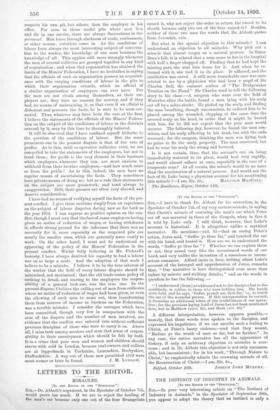[To THE EDITOR OP THE " SPECTATOR."]
have to thank Dr. Abbott for his correction, in the Spectator of October 7th, of my very serious mistake, in saying that Christ's miracle of restoring the man's ear which Peter out off was narrated in three of the Gospels, when in fact it is told by Luke only. I still think, however, that Luke's account is historical. It is altogether unlike a mythical narrative. He mentions—xxii. 51—that on seeing Peter's action, Jesus said, "Suffer ye thus far," and touched the ear with his band, and healed it. How are we to understand the words, " Suffer ye thus far " P Whether we can explain them or not, they sound very like the accustomed words of our Lord, and very unlike the invention of a conscious or uncon- scious romancer. Alford (note in loco), writing about Luke's account of the betrayal and apprehension of Jesus, remarks that, " Our narrative is here distinguished even more than before by minute and striking details ; " and on the words in question he has the following :- " I understand [them] as addressed not to the disciples but to the multitude, or rather, to those who were holding him. His hands were held, and he says, ' Suffer, permit me, thus far,' i.e., to touch the ear of the wounded person. If this interpretation be correct, it furnishes an additional token of the truthfulness of our narra- tive ; for the previous laying hold of Jesus has not been mentioned here, but in Matthew (xxvi. 50), and Mark (xiv. 46)."
A different interpretation, however, appears possible,— namely, that those words were spoken to the disciples, and expressed his impatience, if we can ascribe such a feeling to Christ, at Peter's hasty violence,—and that they meant, " Endure ye the wrath of man so far, but no farther." In any case, the entire narrative has all the appearance of history, if only an arbitrary objection to miracles is over- come ; and in Dr. Abbott this objection is not only unreason- able, but inconsistent; for in his work, "Through Nature to Christ," he emphatically admits the crowning miracle of all, the Resurrection of Christ.—I am, Sir, &c.,


















































 Previous page
Previous page